Mr. Paul Lam SC has been the Secretary for Justice (SJ) of the Hong Kong SAR Government since July 1, 2022. Prior to joining the government, Mr. Lam had a distinguished career as a Senior Counsel in private practice, specializing in general civil and commercial proceedings. He was called to the Hong Kong Bar in 1992 and was appointed Senior Counsel in 2013. He was the Chairman of the Hong Kong Bar Association from 2017 to 2018. He sat as a Deputy Judge of the High Court of Hong Kong for short periods each year since 2015. Mr. Lam’s expertise extends to international arbitration, as he was enlisted in the Panel of Arbitrators of the Shenzhen Court of International Arbitration and The China International Economic and Trade Arbitration Commission. He was also appointed by the China University of Political Science and Law in Beijing as professor from 2019 to 2021.
(a) SJ’s residence
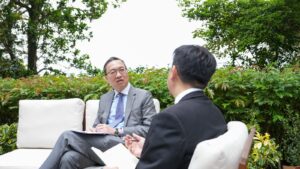
TK: Thank you for inviting me to your residence. We heard that, since assuming the position of Secretary for Justice, you have been making use of the residence to reach out to young people and students for cultivating the spirit of rule of law as well as promoting mediation. Could you tell us more?
SJ: Certainly. Over the years, this house has been a home to previous Secretaries for Justice, carrying a sense of tradition and historical importance.
In addition to its official function, I have had the pleasure of hosting visits for the youth of Hong Kong. Youth engagement holds great significance to me. In December 2023, we organised a Christmas party for teenagers and children from the Child and Family Bereavement Centre of the Tuen Mun Hospital. It was truly heartwarming to see their excitement and curiosity as they engaged in discussions about the law, justice, and their aspirations.
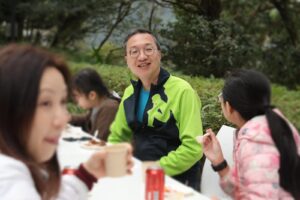
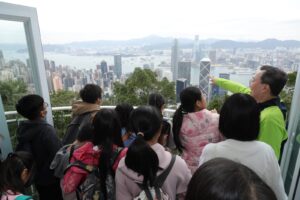
(Source: SJ’s Facebook)
In March 2023, we welcomed nearly 20 students from the Hong Kong Family Welfare Society to the residence. During their visit, we had an interactive storytelling workshop where we explored the art of peer mediation. It was a fantastic opportunity to assist these students in developing effective communication skills and resolving interpersonal conflicts by breaking through negotiation deadlocks.
I firmly believe that empowering children and youth to “level up” their conflict resolution mindset and methods earlier would have immense benefits for their personal growth and future problem-solving abilities. Peer mediation aims to help young individuals express their thoughts calmly and listen to and understand one another, fostering a culture of respect and rationality. At the conclusion of the storytelling session, we planted a “Peace Tree” together, where each student shared their preferred conflict resolution methods by posting them on the tree, forming a “Mediation Guidebook”. I described the essence of mediation as the ability to “look for common ground” and “harmonize differences” by embracing and respecting diverse opinions, allowing everyone to coexist harmoniously. I was delighted to see that the students grasp the essence of mediation so quickly.
It was a joyous occasion, and I hope to continue fostering such opportunities for engagement and learning with different sectors of the community. I am also grateful for the efforts put up by my colleagues from the Department of Justice (DoJ) in supporting these visits. Some of them were from “DoJ Fellows”, an in-house alliance of young government counsel. All their contributions have been invaluable in creating meaningful experiences for these young individuals.

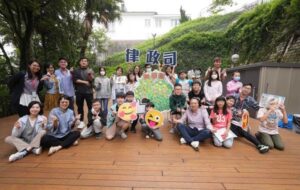
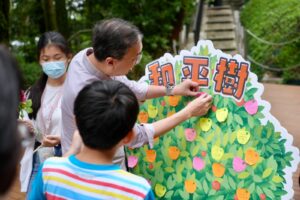
(Source: SJ’s Facebook)
(b) LEAD Office
TK: In October 2022, the Legal Enhancement and Development Office, also known as the LEAD Office, was established in the Secretary for Justice’s Office under your direct steer. Could you share with us how the LEAD Office supports the DoJ’s policy initiatives, particularly in promoting Hong Kong’s legal and dispute resolution services?
SJ: The LEAD Office serves as the central policy unit within the DoJ to render high-level strategic support to me, as well as the Deputy Secretary for Justice, Mr. Horace Cheung. It plays a crucial role in formulating, coordinating, and implementing policy initiatives across three key areas.
Firstly, the LEAD Office strengthens the coordination of rule of law education and training for advocacy leaders, to enhance public awareness, proper understanding and confidence in respect of the rule of law, and to foster a culture of conscientiously upholding the rule of law.
Secondly, the LEAD Office, with the support of other Divisions in the Department including the Alternative Dispute Resolution Team (ADRT) of the Civil Division, promotes the strengths of and opportunities for Hong Kong’s legal and dispute resolution services on multiple fronts. This involves highlighting the expertise and advantages of Hong Kong’s legal system and fostering the wider use of alternative dispute resolution (ADR) services, including arbitration and mediation.
Thirdly, the LEAD Office is dedicated to deepening the integration of legal practices between Hong Kong and other cities in the Guangdong-Hong Kong-Macao Greater Bay Area (GBA) and promoting the wider use of mediation as a means of resolving disputes in the GBA.
(c) Major initiatives and events since assumption of duties
TK: DoJ has been actively promoting mediation as one of the means for effective dispute resolution since the early 2000s. I was honoured to have served as a member of the Steering Committee on Mediation from 2017 to 2022, as well as the Chairperson of the Special Committee on Evaluative Mediation. Could you share with us the major mediation initiatives and events that have taken place since your assumption of office?
SJ: To foster DoJ’s long-term policy initiative to promote the wider use of mediation in the community and to promote Hong Kong as a leading international legal and dispute resolution hub, we have undertaken a number of dispute resolution services related events, and I shall highlight just a few.
One notable achievement is the establishment of the International Organization for Mediation Preparatory Office (IOMed Preparatory Office) in Hong Kong in February 2023. The IOMed will be an international inter-governmental organisation established through consultations among all parties. It will provide friendly, flexible, economical and efficient mediation services for international disputes. It will be a useful supplement to the existing dispute resolution institutions and means of dispute resolution, providing a new platform for the peaceful settlement of international disputes. The membership of the IOMed will maintain openness and inclusiveness. Its establishment also serves as a vote of confidence in Hong Kong as an international legal and dispute resolution centre in the Asia-Pacific Region. We are committed to supporting and assisting in the work of the IOMed Preparatory Office in promoting and applying mediation for resolving international disputes, contributing to harmonious and peaceful international relations. The IOMed Preparatory Office has already commenced the preparatory work relating to the establishment of the IOMed and the negotiation of the relevant international convention. With the strong support of the Central People’s Government, the IOMed, upon its establishment, will have its headquarters housed in the renovated Old Wan Chai Police Station.
Moreover, to integrate Hong Kong into the GBA development, our Department is actively collaborating with the respective legal departments in Guangdong Province and Macau SAR to promote the implementation of a set of unified accreditation standards and code of conduct best practice for mediators, and mediation model rules in the GBA. These initiatives will facilitate the dispute resolution framework in the GBA, foster professional development of mediators, and thereby enhance the confidence of mediation users and facilitate the use of Hong Kong mediation services for cross-boundary disputes within the GBA.
During the annual flagship event “Hong Kong Legal Week” in November 2023, the 6th Shanghai-Hong Kong Commercial Mediation Forum discussed cross-border enforcement of mediated settlement agreements, while the Mediation Lecture explored future opportunities for mediation as an effective and efficient mechanism for resolving international commercial disputes. Both events provided valuable insights into fully leveraging Hong Kong’s distinctive advantages and contributing to national development.
(d) DoJ’s upcoming mediation-related initiatives
TK: Looking ahead, how will DoJ further enhance the development of the mediation practice in Hong Kong?
SJ: As part of our initiatives outlined in the Chief Executive’s Policy Address 2023, we are committed to deepening the mediation culture in Hong Kong, as mediation is generally more affordable than commencing legal proceedings for resolving disputes. Working closely with the industry stakeholders and dispute resolution institutions, we shall continue to strengthen the regulatory system on the accreditation and disciplinary matters of the mediation profession, incorporate standard mediation clauses in government contracts, and encourage private organizations to incorporate similar clauses in their contracts. Our goal is to further enhance the public’s understanding on the benefits of mediation, enhance practitioners training, and further raise the standard and quality of mediators.
Moving forward, as our mediation biennial flagship event, the Mediation Week cum Mediation Conference is scheduled to be held with 4 thematic events, namely “Youth, “SME”, “Community”, “Legal and Dispute Resolution Practitioners” from 6 to 9 May 2024 and a full-day Mediation Conference on 10 May this year. This week-long series of events aims to showcase how mediation can foster harmony in different sectors and raise public awareness about utilizing mediation in everyday disputes. The Mediation Conference will explore topical issues in mediation including the use of mediation in the GBA. The event provides an excellent opportunity for participants, both local and overseas, to keep abreast with the latest developments in mediation and empower them with practical mediation techniques.
Furthermore, echoing our efforts of youth engagement, we shall continue organising the Mediation Essay Competition. The inaugural Competition was held in 2020. Submission for the 2024 edition has just been closed, and the response is overwhelming. Through the Competition, we aim to encourage students to develop a positive and constructive mindset in resolving disputes, understand the importance of resolving conflicts amicably, and maintain harmonious relationships with others.
(e) CJR 15th Anniversary
TK: As the Civil Justice Reform (CJR) celebrates its 15th anniversary this year since its implementation in 2009, how well do you think that CJR has helped promote the use of mediation in facilitating settlement of disputes?
SJ: In Hong Kong, the court litigation process has traditionally followed an adversarial model, where parties are responsible for initiating and defining the nature of their disputes. This often led to excessive costs, delays, and complexity. The CJR was therefore introduced on 2 April 2009 with one of the objectives being to facilitate settlement of disputes. Since the implementation of CJR, in particular, Order 1A and 1B of the Rules of the High Court and the Rules of the District Court and their associated Practice Directions, mediation in Hong Kong has seen exponential growth in its acceptance over the past 15 years. There has been a change of culture in the conduct of dispute resolution on the part of the parties and their lawyers.
The Judiciary has issued several Practice Directions since 2000 implementing pilot schemes for court-adjunct mediation in various practice areas, such as winding up of companies, construction, personal injuries, employee compensations and family disputes. The success of these efforts is evident from the increasing number of cases where mediation has been employed to resolve disputes.
For example, for family disputes, the use of alternative dispute resolution methods is encouraged to minimize distress to the parties involved and promote a harmonious relationship. The Judiciary has in recent years implemented the Mediator-assisted Financial Dispute Resolution and Mediator-assisted Children Dispute Resolution schemes. Alongside family mediation, financial dispute resolution and children dispute resolution, the Judiciary introduced the Pilot Scheme on Private Financial Adjudication for Financial Disputes in Matrimonial and Family Proceedings in 2015, which has recently been extended until 2026. Under the Scheme, parties appoint a private adjudicator, whose decisions are binding on the parties, subject to any overriding discretion of the court. The Scheme seeks to further the objective of settlement facilitation.
The CJR has undeniably played a significant role in promoting the use of mediation and ADR in Hong Kong. Its impact is evident in the positive shift towards settlement-oriented approaches, reducing costs and delays while fostering a more efficient and harmonious resolution of disputes.
(f) Youth engagement and empowerment
TK: As an advocate for youth engagement and empowerment, what words of wisdom would you like to share with our young generation?
SJ: I firmly believe that the young generation holds immense potential and plays a vital role in shaping the future of our society. My message to you is to embrace opportunities for growth, be resilient in the face of challenges, and uphold values of integrity and fairness. Cultivate open-mindedness, empathy, and respect for others’ perspectives. Apply the principles of mediation in your interactions with others – listen actively, seek common ground, and explore creative solutions that satisfy all parties’ needs and interests. Effective communication and empathy are key to achieving peaceful resolutions. Never underestimate the impact you can make as mediators and peacemakers, whether it be in your personal relationships, schools, or the broader community settings. Your ability to facilitate dialogue, bridge differences, and find common ground can help build a culture of understanding and collaboration. So, I encourage the youth to see mediation as a tool for positive change and empower yourselves to be agents of harmony and resolution. Together, we can build a harmonious and inclusive society.
TK: Thank you for taking the time out of your busy schedule to meet me at your residence and have this conversation with me on mediation and related matters. Truly appreciate it.
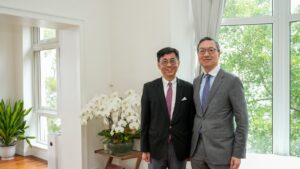
Grateful to Mr. Andy Hong, Government Counsel and Miss Celina Lam, Government Counsel of the Civil Division, Department of Justice for their assistance in preparing this blog.
________________________
To make sure you do not miss out on regular updates from the Kluwer Mediation Blog, please subscribe here.



Thank you TK for highlighting the key development and policy in law and mediation practice in Hong Kong. The dialogue with the Secretary for Justice is informative, and I am particularly impressed with more work on introducing mediation to children and teenagers, the future of our community, by the Administration.
Mediation which helps individuals develop effective communication ability, narrow down differences in opinion to reach consensus and foster relationship building, is indeed a powerful and more cost effective tool that can be used everyday, anywhere and anytime by anyone.
The interview highlights some pivotal aspects of the HKSAR amicable dispute resolution practice. I have learnt a great deal. Thank you for posting this valuable blog.
Jamal Chafra
Hong Kong